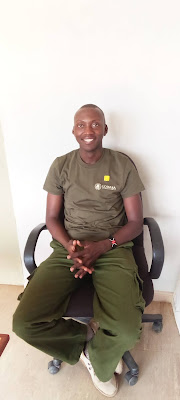Daktari
Kaltuma
“I am a Boran, one of the pastoralist communities, born in the northern part of Kenya (Isiolo). I did my primary education in Samburu County, which is the neighboring county, and secondary in Meru County. I also underwent my diploma course in clinical medicine at Kenya Methodist University in Meru. Coming from a humble background, part of my secondary education and my entire university degree was made possible by a sponsorship programme.”
“When I was young I liked the idea of becoming a doctor but I became even more interested during my secondary schooling. I was inspired by my science tutor who also went on to do medicine later. Although I was good at other subjects like art, I stuck to my initial choice.”
“I had just finished my internship and was doing locum work while I looked out for opportunities for a permanent job. Loisaba Conservancy wanted to start a clinic up and so I applied for the position; I grew up in a game reserve and so working in such an environment was not a problem for me. It was an added advantage that my husband was already working here as the Security Manager so it was great to be able to join him.”
“The work at Loisaba itself is sporadic – I recently helped a guest who had broken his arm quite badly, supporting his arm with a splint before he set off for the hospital. My community work is much more demanding. Through outreach clinics, we offer medical services such as family planning. We help to identify medical cases which require further attention and referral, and we collaborate with a local health facility to reach remote populations. I also play a role in community health programmes, such as the anti-FGM programme, and train Community Health Volunteers who make my activities so much easier by giving health talks, dispensing drugs, and making sure that covid protocols are put in place.”
“I love my job because it allows me to reach different people and to learn more each day; I love the feeling of helping people and making a difference even if it’s only little.”
“My biggest challenge is the distance and transport when it comes to referrals. We send our patients to The Cottage Hospital in Nanyuki for further management. I feel awful about the distance sometimes as it can take three hours along bumpy roads to reach Nanyuki. I will often add a prayer as a back-up plan, and I thank God that we have never had any emergencies with serious complications; most emergencies are respiratory tract infections or minor injuries. It would make my job far easier if we had a standby vehicle or ambulance for such referrals and community outreach days. It will also be far better when the nearest sub-county hospital is fully equipped and provides a wider range of services; people will get to hospital much sooner.”
“Almost all aspects of life have been affected by the pandemic, social, economic, and even spiritual. It’s been hard to watch my friends losing their jobs especially in the tourism industry and notice that there has been a transport hike whereby some passenger-carrying companies have put up their prices substantially because they can no longer carry so many people at once – even though some have carried on cramming people in.”
“Although I am a Muslim, I have always been schooled in Christian-dominated institutions and I have never experienced any kind of discrimination. In my secondary school, there were less than fifty Muslims out of six hundred students but the principal built a prayer room for us and allowed us to cover our hair during Ramadan. During my final year in medical school, we went for attachment at a health center in a rural area with literally no Muslims and I was the only Muslim in my class. One day, an elderly woman came to the health center carrying a basket on her head containing local fruits. She was asking around for a doctor who wears hijab and she finally found me. Apparently, I had attended to her three days before and she came to say thank you. Later that day, many of my colleagues asked me if I had met the old lady who was looking for me. It felt good. Islam has really grown in Kenya and people have learnt to embrace diversity when it comes to religion.”
“My lecturer once said that medicine is not just about making diagnosis and managing them, it is also about having empathy and showing compassion to your patient. This goes miles in the treatment process. I believe that having a good relationship with people creates respect.”
“In the future I would like to continue to expand my knowledge and I would like to specialize in paediatrics in order help children, especially those in pastoralist communities, who are the mostly vulnerable to so many infections.”









Comments
Post a Comment